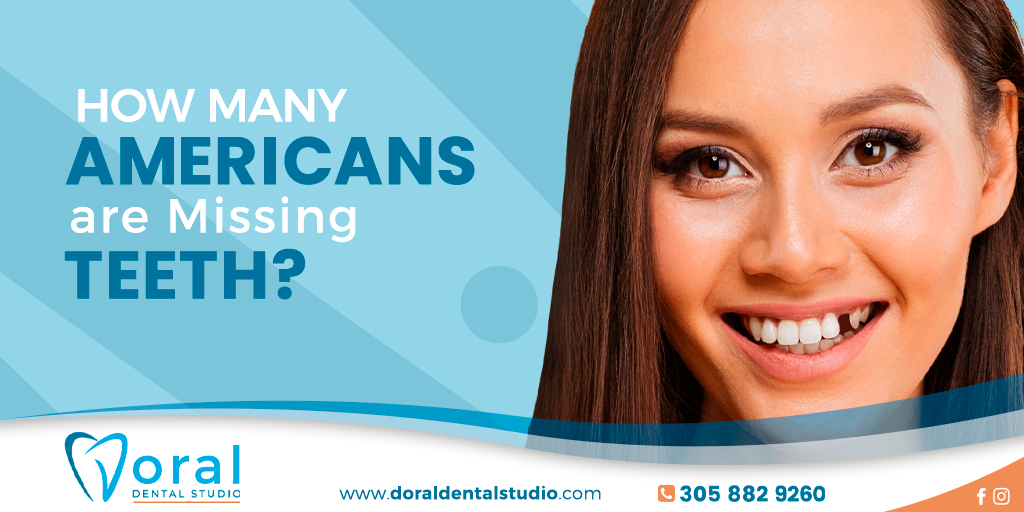If you’re missing a tooth or multiple teeth, the team at Doral Dental Studio can help. We offer the latest restorative dentistry treatments for tooth loss, including custom dentures and dental implants. The treatments can restore your smile and help you bite and chew normally again.
Many patients ask us how common tooth loss is. These statistics on missing teeth will offer some interesting perspective on this issue. We can discuss tooth loss and options for treatment in more detail during your visit to our Doral Florida dental center.
How Many Americans Are Missing Teeth?
According to the American College of Prosthodontists (ACP), roughly 178 million Americans are missing at least one tooth. In addition, approximately 40 million Americans are missing all of their teeth.
The Most Common Causes of Tooth Loss
Some of the most common causes of tooth loss include:
- Tooth decay
- Gum disease
- Physical trauma
- Cancer
- Bone disease
- Normal wear and tear
Do give some of these causes some statistics perspective, the Centers for Disease Control and Prevention (CDC) notes that 1 in 5 adults age 65 or older suffers from untreated tooth decay, and that 68 percent of adults in that same age range suffer from gum disease.
Tooth Loss and Age
As people get older, they are more likely to experience tooth loss and to lose more teeth. The National Institute of Dental and Craniofacial Research (NIDCR) has some fascinating numbers regarding remaining teeth and different age groups.
Keep in mind that in an average mouth, there are 28 teeth (not counting wisdom teeth).
- Americans 20 to 34 years of age – 26.90 remaining teeth
- Americans 35 to 49 years of age – 25.05 remaining teeth
- Americans 50 to 64 years of age – 22.30 remaining teeth
The NIDCR also found that 10.13 percent of Americans between the ages of 50 to 64 have no teeth remaining. The CDC estimates that 13 percent of Americans between the ages of 65 to 74 have no teeth, and that 26 percent of Americans 75 and older have no teeth.
Smoking and Tooth Loss
Smoking has been linked to gum disease and a host of other health issues that can affect dental health. The ACP suggests smokers are three times more likely to develop gum disease than non-smokers. It should come as no surprise that the NIDCR found these numbers related to tooth loss and smoking:
- Current Smokers – 23.47 teeth remaining
- Former Smokers – 25.12 teeth remaining
- Lifelong Non-Smokers – 25.67 teeth remaining
Given these statistics, consider this yet another compelling reason to kick the habit for good.
Class and Socioeconomic Factors
The findings by the NIDCR noticed some interesting correlations between income, education, and tooth loss.
People below the poverty level were more likely to suffer from serious tooth loss. People living at or below the poverty line in America had an average of 23.52 remaining teeth. Approximately 9.28 percent of individuals living at or below the poverty line had lost all of their teeth.
Related to poverty, Americans with less than a high school education had an average of 23.1 teeth remaining. Among people without a high school education, 8.07 percent had lost all of their teeth.
Learn More About Tooth Loss
For more information about tooth loss and how missing teeth can be treated, be sure to contact an experienced cosmetic and restorative dentist. We at DDS are here to help. You can reach us by phone at 305.882.9260

